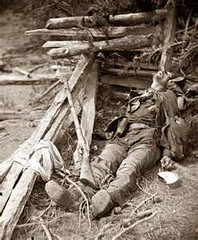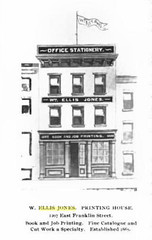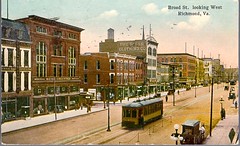The following is a revised and edited (into modern English) transcription of a slave narrative recorded on June 1, 1937 by Travis Jordan, a Works Progress Administration writer, working with the Writer’s Project. The original narrative as recorded is available below, and the original document is available at the national archives in Washington, D.C. It is available also through Project Gutenberg, here.
I have chosen to include this particular narrative because the subject, Ida Adkins, belonged to Frank Jeffries of Franklin County, North Carolina (very near the town of Louisburg.) I have not been able to absolutely verify my relationship to this Frank Jeffries as of yet, however I am related to a Frank Jeffries from the same area, who is a generation or two younger. It’s likely that my Frank Jeffries was the son or grandson of Ida Adkin’s “Master Frank Jeffries.” A secondary reason for inclusion is the reference to “bee gums” (hollowed logs housing honey bee colonies.) Her master was a beekeeper. I am a beekeeper. Her solution to the home invasion was a good one and one that I have contemplated many times. This story hits home with me.
————

“Bee Gums” – or more familiarly “Log Hives” – were the common way to keep domesticated bees prior to the development of modern beekeeping methods in the 1880’s.
IDA ADKINS – Ex-slave 79 years.
“I was born before the war. I was about eight years old when the Yankee men came through.
My mother and father, Hattie and Jim Jeffries, belonged to Master Frank Jeffries. Master Frank came from Mississippi, but when I was born he and Miss Mary Jane were living down here near Louisburg in North Carolina, where they had a big plantation and I don’t know how many niggers. Master Frank was good to his niggers, except he never gave them enough to eat. He worked them hard on half rations, but he didn’t believe in beating them all the time and selling them.
My father worked at the stables; he was a good horseman, but my mother worked at the big house helping Miss Mary Jane. Mother worked in the weaving room. I can see her now sitting at the weaving machine and hear the pedals going plop, plop, as she treadled them with her feet. She was a good weaver. I stayed around the big house too, picking up chips, sweeping the yard and such as that.
Miss Mary Jane was quick as a whippoorwill. She had black eyes that snapped and saw everything. She could turn her head so quick she’d catch you every time you tried to steal a lump of sugar. I liked Master Frank better than I liked Miss Mary Jane. All of us little children called him “Big Pappy”. Every time he went to Raleigh he brought us niggers back some candy. He went to Raleigh about twice a year. Raleigh was far away from the plantations – nearly sixty miles. It always too Master Frank three days to make the trip. A day to go, a day to stay in town, and a day to come back. Then he always got home at night. Except sometimes he rode on horseback instead of the carriage; then he would sometimes get home by sun down.
Master Frank didn’t go to the war. He was too old. So when the Yankee’s came through they found him at home. When Master Frank saw the blue coats coming down the road he ran and got his gun. The Yankee’s were on horses. I have never seen so many men. They were as thick as hornets coming down the road in a cloud of dust. They came up to the house and tied their horses to the pilings around the yard. When they saw Master Frank standing on the porch with the gun leveled on them, they got mad. By the time Master Frank shot one time, a bully Yankee snatched the gun away and told Master Frank to hold up his hands. They tied his hands and pushed him down on the floor, beside the house, and told him that if he moved they would shoot him. Then they went in the house.
I was scared nearly to death, but I ran to the kitchen and got a butcher knife, and when the Yankee’s weren’t looking, I tried to cut the rope and set Master Frank free. But one of those blue devils saw me and came running. He said, “What are you doing, you black brat! You stinking little alligator bait!”
He snatched the knife from my hand and told me to stick out my tongue, that he was going to cut it off. I let out a yell and ran behind the house.
Some of the Yankee’s were in the smokehouse getting the meat, some of them at the stables getting the horses, and some were in the house getting the silver and things. I saw them put the big silver pitcher and tea pot in a bag. Then they took the knives and forks and all the candle sticks and platters off the sideboard. They went in the parlor and got the gold clock that was Miss Mary Jane’s grandmothers. Then they got all the jewelry out of Miss Mary Jane’s box.
They went up to Miss Mary Jane, and while she looked at them with her black eyes snapping, they took the rings off her fingers, then they took her gold bracelet. They even tool the ruby earrings out of her ears and the gold comb out of her hair.
I had quit peeping in the window and was standing beside the house when the Yankees came out in the yard with all the stuff they were carrying off. Master Frank was still sitting on the porch with his hands tied and couldn’t do anything. About that time I saw the bee gums (bee hives) in the side yard. There was a whole line of beehives. Little as I was I had a notion. I ran and got a long stick and turned over every one of those hives. Then I stirred up those bees with that stick till they were so mad I could smell the poison. And bees! You have never seen the likes of bees. They were swarming all over the place. They sailed into those Yankee’s like bullets, each one madder than the other. They lit on their horses til they looked like they were alive with varmints. The horses broke their bridles and tore down the pilings and lit out down the road. But their running was nothing to what the Yankee’s did. They burst out cussing, but what did a bee care about cuss words? They lit on those blue coats and every time they lit they stuck in a poison sting. The Yankees forgot all about the meat and things they had stolen. They took off down the road on the run, passing the horses. The bees were right after them in a long line. They’d zoom and zip, and every time they’d zip a Yankee would yell.
When they were gone, Miss Mary Jane untied Master Frank. Then they took all the silver, meat and things that the Yankee’s left behind and buried it so if they came back they couldn’t find it.
Then they called for mother and said, “Ida Lee, if you hadn’t turned over those beehives those Yankee’s would have taken off nearly everything fine we have. We want to give you something you can keep so you’ll always remember this day, and how you ran those Yankee’s away.”
Then Miss Mary Jane took a plain gold ring off of her finger and put it on mine. And I’ve been wearing it ever since.”
————–
ORIGINAL TRANSCRIPT; Un-edited, below.
————–
N.C. District: No. 3
Worker: Travis Jordan
No. Words: 1500
Title: Ida Adkins Ex-slave
Person Interviewed: Ida Adkins
Editor: Daisy Bailey Waitt
County Home, Durham, N.C.
Date Stamp: “JUN 1 1937”
[Pg 9]
IDA ADKINS – Ex-slave 79 years.
“I wuz bawn befo’ de war. I wuz about eight years ole when de Yankee mens come through.
My mammy an’ pappy, Hattie an’ Jim Jeffries belonged to Marse Frank Jeffries. Marse Frank come from Mississippi, but when I wuz bawn he an’ Mis’ Mary Jane wuz livin’ down herr near Louisburg in North Carolina whare dey had er big plantation an’ don’ know how many niggers. Marse Frank wuz good to his niggers, ‘cept he never give dem ernough to eat. He worked dem hard on half rations, but he didn’ believe in all de time beatin’ an’ sellin’ dem.
My pappy worked at de stables, he wuz er good horseman, but my mammy worked at de big house helpin’ Mis’ Mary Jane. Mammy worked in de weavin’ room. I can see her now settin’ at de weavin’ machine an’ hear de pedals goin’ plop, plop, as she treaded dem wid her feets. She wuz a good weaver. I stayed ‘roun’ de big house too, pickin’ up chips, sweepin’ de yard an’ such as dat. Mis’ Mary Jane wuz quick as er whippo’-will. She had black eyes dat snapped, an’ dey seed everythin’. She could turn her head so quick dat she’d ketch you every time you tried to steal a lump of sugar. I liked Marse Frank better den I did Mis’ Mary Jane. All us little chillun called him Big Pappy. Every time he went to Raleigh he brung us niggers back some candy. He went to Raleigh erbout twice er year. Raleigh wuz er far ways from de plantations—near ’bout sixty miles. It always took Marse Frank three days to make de trip. A day to go,[Pg 10] er’ day to stay in town, an’ a day to come back. Den he always got home in de night. Ceptn’ he rode ho’se back ‘stead of de carriage, den sometimes he got home by sun down.
Marse Frank didn’ go to de war. He wuz too ole. So when de Yankees come through dey foun’ him at home. When Marse Frank seed de blue coats comin’ down de road he run an’ got his gun. De Yankees was on horses. I ain’t never seed so many men. Dey was thick as hornets comin’ down de road in a cloud of dus’. Dey come up to de house an’ tied de horses to de palin’s; ‘roun’ de yard . When dey seed Marse Frank standin’ on de po’ch wid de gun leveled on dem, dey got mad. Time Marse Frank done shot one time a bully Yankee snatched de gun away an’ tole Marse Frank to hold up his hand. Den dey tied his hands an’ pushed him down on de floor ‘side de house an’ tole him dat if he moved dey would shoot him. Den dey went in de house.
I wuz skeered near ’bout to death, but I run in de kitchen an’ got a butcher knife, an’ when de Yankees wasn’ lookin’, I tried to cut de rope an’ set Marse Frank free. But one of dem blue debils seed me an’ come runnin’. He say:
‘Whut you doin’, you black brat! you stinkin’ little alligator bait!’ He snatched de knife from my hand an’ told me to stick out my tongue, dat he wuz gwine to cut it off. I let out a yell an’ run behin’ de house.
Some of de Yankees was in de smoke house gettin’ de meat, some[Pg 11] of dem wuz at de stables gettin’ de ho’ses, an’ some of dem wuz in de house gettin’ de silver an’ things. I seed dem put de big silver pitcher an’ tea pot in a bag. Den dey took de knives an’ fo’ks an’ all de candle sticks an’ platters off de side board. Dey went in de parlor an’ got de gol’ clock dat wuz Mis’ Mary Jane’s gran’mammy’s. Den dey got all de jewelry out of Mis’ Mary Jane’s box.
Dey went up to Mis’ Mary Jane, an’ while she looked at dem wid her black eyes snappin’, dey took de rings off her fingers; den dey took her gol’ bracelet; dey even took de ruby ear rings out of her ears an’ de gol’ comb out of her hair.
I done quit peepin’ in de window an’ wuz standin’ ‘side de house when de Yankees come out in de yard wid all de stuff dey wuz totin’ off. Marse Frank wuz still settin’ on de po’ch floor wid his han’s tied an’ couldn’ do nothin’. ‘Bout dat time I seed de bee gums in de side yard. Dey wuz a whole line of gums. Little as I wuz I had a notion. I run an’ got me a long stick an’ tu’ned over every one of dem gums. Den I stirred dem bees up wid dat stick ‘twell dey wuz so mad I could smell de pizen. An’ bees! you ain’t never seed de like of bees. Dey wuz swarmin’ all over de place. Dey sailed into dem Yankees like bullets, each one madder den de other. Dey lit on dem ho’ses ‘twell dey looked like dey wuz live wid varmints. De ho’ses broke dey bridles an’ tore down de palin’s an’ lit out down de road. But dey runnin’ wuzn’ nothin’ to what dem Yankees done. Dey bust out cussin’, but what did a bee keer about cuss words! Dey[Pg 12] lit on dem blue coats an’ every time dey lit dey stuck in a pizen sting. De Yankee’s forgot all about de meat an’ things dey done stole; dey took off down de road on er run, passin’ de horses. De bees was right after dem in a long line. Dey’d zoom an’ zip, an’ zoom an’ zip, an’ every time dey’d zip a Yankee would yell.
When dey’d gone Mis’ Mary Jane untied Marse Frank. Den dey took all de silver, meat an’ things de Yankees lef’ behin’ an’ buried it so if dey come back dey couldn’ fin’ it.
Den day called ma an’ said:
‘Ida Lee, if you hadn’t tu’ned over dem bee gums dem Yankees would have toted off near ’bout everythin’ fine we got. We want to give you somethin’ you can keep so’ you’ll always remember dis day, an’ how you run de Yankees away.’
Den Mis’ Mary Jane took a plain gold ring off her finger an’ put it on mine. An’ I been wearin’ it ever since.”
-------
This eBook is for the use of anyone anywhere at no cost and with almost no restrictions
whatsoever. You may copy it, give it away or re-use it under the terms of the Project
Gutenberg License included with this eBook or online at www.gutenberg.org
 Slaves in the Family, by Edward Ball
Slaves in the Family, by Edward Ball












You must be logged in to post a comment.